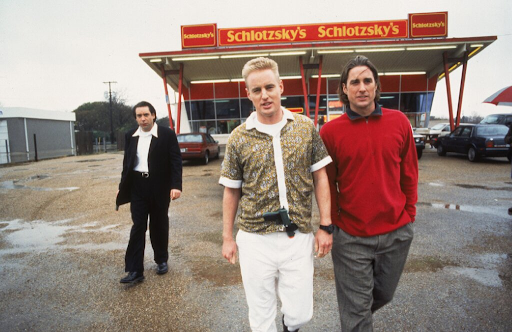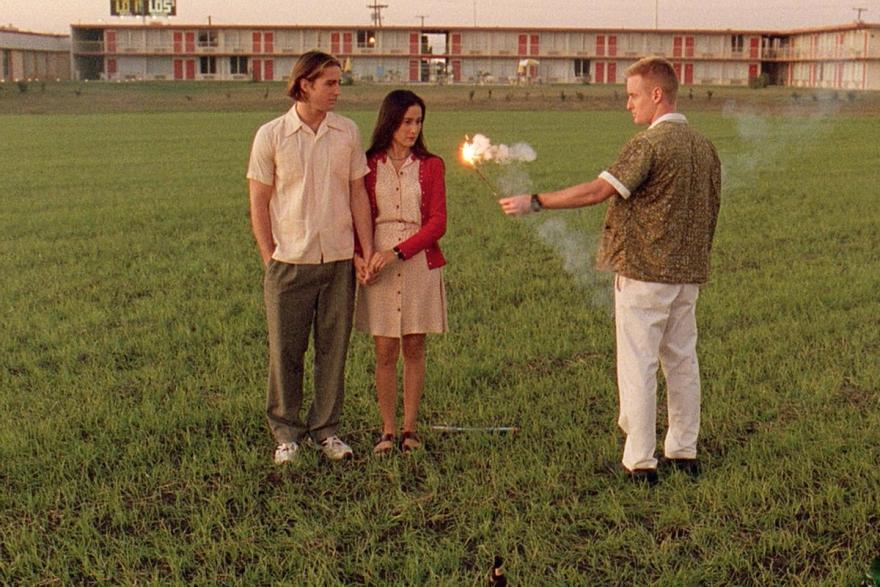We have glossed this “The Year of the Process” for No Laying Up, so let’s begin. Those that listened to the “2021 Goals” episode of the TrapDraw podcast heard me talk about an itch to build on last year’s movie goal. The idea I settled on was to take some time each month and write about a film for this increasingly-golf-adjacent website. For better or worse, here is installment, No. 1.
• • •
“Bottle Rocket” (1996)
Directed by Wes Anderson
Written by Wes Anderson and Owen Wilson

“They’ll never catch me, man… Because I’m fuckin’ innocent.” – Dignan, mid-robbery
If you have any questions about Dignan’s dedication to The Process, please look no further than his bulletproof 75-year plan.
Yes, the finer points of his proposal get a little off the rails throughout “Bottle Rocket,” the first film by Wes Anderson. But you can’t tell me it’s due to a lack of planning and process.
I have a tough time thinking of a character that can make me mood-swing harder between joy and immense heartbreak than Dignan can. It’s a character so good that it has never even bothered me that Owen Wilson (or Owen C. Wilson as he was known in his debut role) has seemed to dust it off for just about every role he’s played since. Borrowing from Scott Tobias (A.V. Club) here, but Wilson’s role in “Armageddon” feels a lot like “Dignan in Space.” Eli Cash in “The Royal Tenenbaums” and Hansel in “Zoolander” both have shades of what it would look like if the world placed a little more value on Dignan’s specific set of skills. If your old pal Dignan finally got a little recognition for his painstaking work.
And to be clear, I love all these roles. I love watching Owen Wilson in anything. All of those characters – but none more than Dignan – are earnest, sweet, loyal, delusional and cripplingly insecure. Each of the three main characters in “Bottle Rocket” possess all of these traits as well and I think seeing them in contrast with each other is what I’ve grown to love so much about the movie.
They might all have different names for it, and different plans of action, but all three main characters in the film seem to be trying their best to stave off some level of depression and aimlessness. “Bottle Rocket” is framed through the journey of Anthony (Luke Wilson), who begins the film by “escaping” from a high-end mental rehabilitation facility. He spends the rest of the movie pondering the meaning of his existence and finding it in – among other things – a motel housekeeper from Paraguay, his “program” of daily routine and coaching youth soccer. This is Anthony’s Process.
It all stems from a “what is the point of talking about watersports?” feeling that young, bookish, handsome stars have been dealing with for ages. In fact, we get a nod to the godfather of the Aimless Boys with a swimming pool shot straight out of “The Graduate” when Anthony first arrives at the motel.
And like Benjamin Braddock before him, Anthony goes straight from the swimming pool into a very... unconventional relationship. There’s no shortage of heartwarming or peculiar thoughts or interpretations to have about the Anthony-Inez relationship – a relationship where the participants barely speak each other’s language. But what is more interesting to me is the fact that no matter how many times Anthony tries to re-wire his life – to try to force some semblance of connection or place or meaning – the one thing he can’t stop doing is trying to make Dignan feel just a little less alone.

“Did it ever occur to you that your old pal Dignan might enjoy a great stay at some mental hospital out in the middle of nowhere?” – Dignan
While Bob, Dignan and Anthony all seem to be going through somewhat similar internal crises, I think what’s most interesting is that they’re all doing it from drastically different circumstances.
Bob’s emotional journey is thrown in almost for comedic effect (“I’ve been through some pretty heavy shit myself.”) As is made obvious and key to the plot, Bob comes from a ton of money – of course, a shout out to Future Man’s Pine Valley shirt in the country club scene.
And judging by Anthony’s rehab location, his stories of hanging at lake houses with beautiful girls, his sister’s private school (“What has she ever accomplished with her life that’s so great?”), it’s clear that his family has some means as well. And while money certainly isn’t a fix for what either Anthony or Bob is going through, it does at least allow for the “luxury” of sitting around and ruminating about it.
Again, like in “The Graduate,” it’s so easy to acutely identify with both the feeling of existential aimlessness, while, at the same time, screaming at the TV that it might help if both characters would get out of the god damn pool for a little while. “Get a job, sir!”
One thing that makes Dignan unique to this trio is that he seems to have none of these resources (“You know there’s nothing to steal from my mom and Craig!”). He has no car. He has no role models that weren’t lifted straight from heist or kung-fu movies. This is why he naively and loyally chases the caricature of Mr. Henry (Fact: Mr. Henry has a Jaguar).
Mr. Henry reminds me of the John Mulaney line about Donald Trump – that he’s like a hobo’s idea of what a rich guy is. And in this instance, our hobo is Dignan, picturing what it would be like to have it all figured out. Ice cream cones by day and elaborate heists by night. All the while wearing what no one else is man enough to wear. Try not to laugh out loud when picturing Mr. Henry having a Very Serious Conversation while wearing a ponytail, socks-and-sandals and his karate robe.
But it’s actually kind of easy to see why Dignan buys in. At a bare minimum, Anthony and Bob have some financial insulation to help keep their misery at a bit of a distance – as an inconvenience to be worked on and treated as part of a slow rebuild. They can take up hobbies like jogging or coaching or being a construction worker or a valet while they think about what it all means.
The only lifeboat with room for Dignan is captained by the owner of the Lawn Wranglers who is doing karate in his underwear.
Of course, no matter how hard Dignan is willing to pull himself up by his bootstraps, one simply does not become Abe Henry overnight. It takes time and planning. So, as life continues to kick him between the legs of his yellow jumpsuit, Dignan's only real option is to dedicate himself to his own Process. His only defense from the onslaught of the world is to go on offense. To make a plan. “I don’t think we get anywhere by complaining, guys.”
One of those nut shots comes in the most gut-wrenching scene in the movie, when, just for fun, Future Man gives Dignan an emotional de-pantsing (“Keep up the mowing, kemosabe.”). This is where Wes Anderson flexes the magic trick that seems to level me in all of his movies. When he takes a character as patently ridiculous as Dignan and, with a flash of crushing humanity, he makes the absurd facade fall away. In that moment, you’re left recognizing at least a shred of yourself in what’s still standing. Dignan puts it best in one of the greatest lines in the film. Sometimes we’re not always as confident as we look.
Since he doesn’t have time to coach youth soccer, Dignan’s Process is rooted in something a little more conventional. To establish some shred of control over his life, he tries to obsessively plan out every detail. To control a completely uncontrollable situation. Looked at in that way, doesn’t ridiculous Dignan sort of become the most relatable character in the film? Who hasn’t tried to do the same? And who hasn’t failed just as spectacularly as he does? But who didn’t feel better for at least trying?
Dignan’s plan for the next 75 years might be based around wrangling lawns and doing crimes, but I’m not sure that makes his process of planning any less noble. The alternative is to simply let his life wash over him. To continue trimming the hedges for Future Man.
Of course his plans don’t come to fruition. Ours usually don’t either. People change. They have horribly-timed heart attacks. But this doesn’t mean you stop making plans. Even in the shittiest of circumstances – with nothing at your disposal – you can always make a plan. There’s always a chance to take Step 1.
Dignan fails at almost every possible thing in this movie. But he never fails at making a plan.
• • •
“Everybody wants to know what’s next. May I enjoy this moment?”